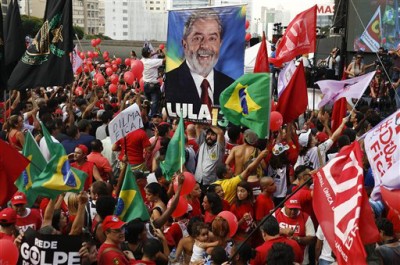
RIO DE JANEIRO (AP) — A Supreme Court justice on Friday suspended former Brazilian President Luiz Inacio Lula da Silva’s appointment to a Cabinet post amid a corruption investigation, calling it a clear attempt to help the once wildly popular ex-leader get around his legal woes.
Justice Gilmar Mendes’ decision was likely to stoke already high tensions and came shortly after tens of thousands of supporters of Brazil’s center-left government rallied to back Silva and his successor, current President Dilma Rousseff. Anti-government protests over the weekend brought an estimated 3 million people onto the streets in nationwide.
“The goal of the falsity is clear: prevent the carrying out of preventative arrest order” against Silva being considered by a lower court, Mendes wrote in his ruling.
Two weeks ago, Silva was brought in for questioning in a sprawling investigation into an alleged kickback scheme in the state oil company Petrobras. If he becomes a Cabinet minister, he can only be prosecuted with the approval of the Supreme Court.
Mendes’ decision leaves Silva, and Latin America’s largest nation, in limbo. The government will surely appeal the decision, which will eventually have to be decided by the full Court. However, with Holy Week next week, it could be some time before the full court meets.
The political turmoil comes as Brazil prepares to host the Summer Olympics in August and Latin America’s most populous nation faces crises on several fronts. The country is at the center of an outbreak of the Zika virus, which health experts believe can cause abnormally small heads in newborns. And its economy, long an engine for neighboring countries, has sharply contracted by nearly 4 percent. Inflation has spiked the last year and announcements of job layoffs have become common.
The decision by Mendes, who criticized Silva’s appointment earlier this week, was the latest volley in what has become a legal game of ping-pong all week. Earlier Friday, an appeals court slapped down a separate attempt to keep Silva from returning to the government while tens of thousands of his supporters rallied to back an embattled government facing a host of crises.
Silva was sworn in as chief aide to Rousseff on Thursday, a post that will let the charismatic politician help the president battle an impeachment effort and one that also makes it harder to investigate any possible links to a corruption scandal at the state oil company.
Supporters of Silva, who was one of the world’s most famous leaders as president from 2003 to 2010, gathered in rallies across Brazil, particularly in the industrial south, where the former factory worker has his base. Many wore red T-shirts and caps and frequently chanted, “Lula, the minister of hope.”
The respected Datafolha polling agency estimated 95,000 people took part in the rally, while police estimates put turnout at 80,000.
When Silva appeared on top of a large sound truck to address the crowd he was greeted with loud cheers and shouts of “Lula, Lula.”
“Next week, if there is no impediment, I will start to proudly serve President Dilma and the Brazilian people,” he said.
“I am going back to help President Dilma do what must be done — re-establish peace and hope. There is no room for hate in this country.” He wound up his 20 minute speech staring at the crowd and shouting: “there will be no coup.”
While Rousseff’s opponents accuse her of trying to help Silva avoid legal woes, her supporters have a different take. They say the 70-year-old Silva, known for his ability to build consensus, could save Rousseff’s job and help bring the economy back from the abyss.
Rousseff, with approval ratings in the single digits, is fighting against attempts to oust her over allegations of fiscal mismanagement unrelated to the Petrobras case. The move toward impeachment advanced this week as the lower house established a special commission on the matter.
Both Rousseff and Lula have repeatedly denied any wrongdoing.
In a public letter Friday, Silva called the last two weeks “sad and embarrassing episodes” that hurt all Brazilians.
As he often does, he harkened to his hardscrabble past. He noted he had little formal education, “But I know, as a human being, how to distinguish between right and wrong, and what is justice and injustice.”
He also questioned the legality of the surprise release of tapped phone calls between him and a host of prominent public figures, including Rousseff herself.
Judge Sergio Moro, overseeing the Petrobras case, released the recordings late Wednesday, hours after the announcement of Silva’s appointment, saying that the taps appeared to suggest attempts to influence judicial officials in Lula’s favor.
Rousseff called the recordings illegal and said their release made “clear the attempt to overstep the limits of the democratic state.”
In his Friday decision, Mendes also ruled that the investigation into Silva would stay in the hands of Moro. Supporters of Silva and his Workers Party accuse Moro of being on a politically motivated witch hunt, and have tried to get him removed from the case.
END

Be the first to comment